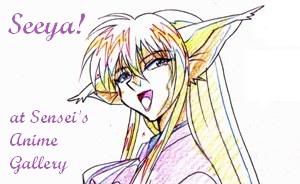Random Question
Random Question
So this something I've always wondered. How do you pronounce douga and genga? I've never heard anyone actually say those words, I've only read them. I pronounce douga: doh-guh and genga: jen-guh (like the game).
Re: Random Question
You have douga correct (though I tend towards doh-gah), but "genga" would be pronounced with a hard G. Think "Ken", but "Gen".
You can feed the japanese into translate.google.com to get a pronunciation approximation. Click on the speaker icon on the japanese side of the text input, and it'll read it out to you.
You can feed the japanese into translate.google.com to get a pronunciation approximation. Click on the speaker icon on the japanese side of the text input, and it'll read it out to you.
- sensei
- Moderator and Admin-in-waiting

- Posts: 5001
- Joined: Fri Oct 01, 2004 6:55 am
- Location: Cephiro
- Contact:
Re: Random Question
Agree. The root of both, "ga" means "drawing." Gen-ga (hard g's both syllables) means "foundation drawing," or "keyframe" in US animating jargon.
Dou-ga (and the "u" isn't pronounced, it's just a sign that the "o" is held an extra beat) means "moving drawing," i.e., the images that are part of the final animated sequence (or "cut")
All the vowels are pronounced more as in Latin, Italian, or Spanish than in English. So "dou" is more like "daw" than "dough" or "dew." Japanese does not have strong accents in words, so give each syllable equal stress. Gen-ga, not Gen-ga. And don't make the "ng" a single sound as in "gang." Gen-ga. Daaw-ga.
Man-ga has the same root. That means "whimsical" or "playfully exaggerated" drawing. Some sites say it means "undisciplined" or "reprehensible" drawing, but this is not supported by Chinese use of the same characters, which usually mean "caricature," a distorted image for comic or satiric effect. Again, Mahn-ga, not "Mang-guh."
Dou-ga (and the "u" isn't pronounced, it's just a sign that the "o" is held an extra beat) means "moving drawing," i.e., the images that are part of the final animated sequence (or "cut")
All the vowels are pronounced more as in Latin, Italian, or Spanish than in English. So "dou" is more like "daw" than "dough" or "dew." Japanese does not have strong accents in words, so give each syllable equal stress. Gen-ga, not Gen-ga. And don't make the "ng" a single sound as in "gang." Gen-ga. Daaw-ga.
Man-ga has the same root. That means "whimsical" or "playfully exaggerated" drawing. Some sites say it means "undisciplined" or "reprehensible" drawing, but this is not supported by Chinese use of the same characters, which usually mean "caricature," a distorted image for comic or satiric effect. Again, Mahn-ga, not "Mang-guh."
Re: Random Question
Wow thanks for the info!
